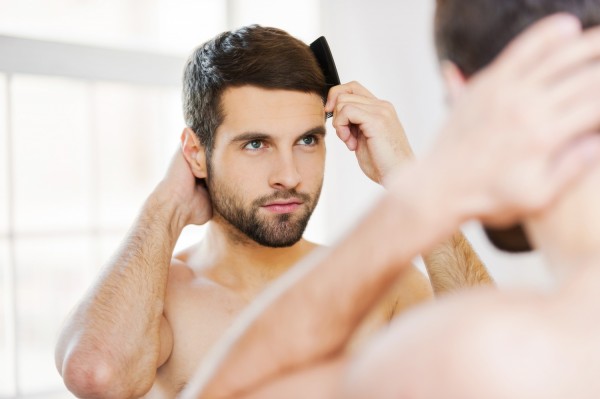 (Photo : Vecteezy/ Denys Golub)
(Photo : Vecteezy/ Denys Golub)
Thinning hair and balding can significantly impact confidence and self-esteem, especially among men aiming to enhance their appearance through hairstyles.
Various factors contribute to thinning hair, ranging from genetics and stress to hormonal imbalances, inadequate hair care practices, and medical conditions like alopecia areata. Seeking advice from a healthcare professional is crucial to identify the underlying cause and explore targeted solutions.
But there are also some hair care steps and lifestyle changes men can do to help maintain or improve the volume of their locks. Here are some simple tips for men seeking to attain thicker hair.
1. Protect your hair from the sun
Shielding your skin from the sun's rays is a must, and your scalp is no exception. Research from Fulham Scalp & Hair Clinic found that sun exposure plays a significant role in hair thinning. This occurs as UV rays penetrate the scalp, surpassing the epidermis -- the outermost layer of the skin -- and causing damage.
To safeguard your scalp, consider wearing a cap when outdoors or opt for hair care products equipped with SPF or UV protection. These precautions help mitigate the adverse effects of sun exposure on your hair and scalp health.
2. Avoid harsh hair products and treatments
Excessive reliance on hair products or undergoing harsh treatments can play a role in hair thinning. Steering clear of these practices is crucial when striving for thicker hair, as their chemical components can harm and weaken the hair.
The Osteopathic Center for Healing said that harsh products like gels, sprays, perms, relaxers, and various chemical treatments may cause hair thinning. Certain products can even cause permanent damage to your follicles, hindering hair growth from those areas. Therefore, it's vital to meticulously consider the products you incorporate into your hair care routine.
3. Incorporate hair oils into your routine
Utilizing hair oils provides multiple benefits for your hair's well-being. According to Head & Shoulders, gentlemen aiming for robust and healthy hair can benefit from massaging oils, particularly argan oil, into their scalp. This ritual boosts blood circulation, ensuring essential nutrients reach the scalp and follicles, fostering the ideal conditions for thicker and healthier hair.
4. Wash your hair fewer times
Washing your hair everyday isn't recommended, as frequent shampooing can remove natural and essential oils, making your hair more susceptible to damage. Dr. Yates MD noted that unless you are using an all-natural shampoo, each wash can completely strip the hair of its vital oils. These oils, like sebum, are produced to protect the hair. Daily shampooing disrupts this protective layer, leaving the hair more prone to damage.
5. Use thickening shampoo
Numerous thickening shampoos are available online, specially crafted to help men achieve thicker hair. Take, for instance, Dove's Men+Care Thick & Strong Fortifying 2-in-1 Shampoo for Thin Hair, available on the brand's website. Formulated with caffeine and calcium, this shampoo and conditioner combo aims to strengthen hair from its roots to the ends, visibly enhancing thickness and fullness.
6. Manage stress
Stress, as previously noted, can contribute to hair thinning. The Mayo Clinic stated that while stress-related hair loss is a possibility, it doesn't necessarily mean it's permanent. Taking steps to manage and reduce stress levels might lead to hair regrowth, offering hope for those experiencing this issue.
Stress management could potentially play a significant role in restoring hair health, but it's best to talk to your doctor for proper guidance.
7. Eat healthy and take vitamins
A balanced diet can play a role in preventing hair loss. Healthline suggested that not getting enough of the right nutrients may make you lose hair, although more research is required to establish the connection.
The health information provider recommended eating a balanced diet with vitamins D and B12, iron, riboflavin, and biotin to help your hair grow, especially if you're losing hair because of poor nutrition. A 2019 study published in Dermatology and Therapy linked deficiencies of these vitamins to hair loss.

